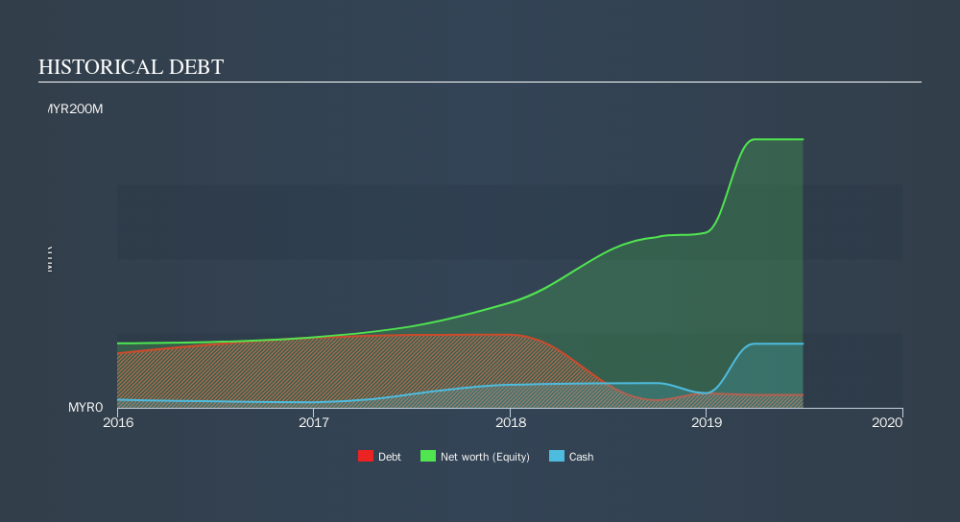Here's Why Heng Hup Holdings (HKG:1891) Can Manage Its Debt Responsibly

Legendary fund manager Li Lu (who Charlie Munger backed) once said, 'The biggest investment risk is not the volatility of prices, but whether you will suffer a permanent loss of capital. It's only natural to consider a company's balance sheet when you examine how risky it is, since debt is often involved when a business collapses. We can see that Heng Hup Holdings Limited (HKG:1891) does use debt in its business. But is this debt a concern to shareholders?
When Is Debt A Problem?
Debt is a tool to help businesses grow, but if a business is incapable of paying off its lenders, then it exists at their mercy. Part and parcel of capitalism is the process of 'creative destruction' where failed businesses are mercilessly liquidated by their bankers. However, a more frequent (but still costly) occurrence is where a company must issue shares at bargain-basement prices, permanently diluting shareholders, just to shore up its balance sheet. Having said that, the most common situation is where a company manages its debt reasonably well - and to its own advantage. The first step when considering a company's debt levels is to consider its cash and debt together.
See our latest analysis for Heng Hup Holdings
What Is Heng Hup Holdings's Net Debt?
The image below, which you can click on for greater detail, shows that at June 2019 Heng Hup Holdings had debt of RM8.74m, up from RM5.57m in one year. But on the other hand it also has RM42.9m in cash, leading to a RM34.1m net cash position.
How Healthy Is Heng Hup Holdings's Balance Sheet?
The latest balance sheet data shows that Heng Hup Holdings had liabilities of RM31.8m due within a year, and liabilities of RM6.41m falling due after that. Offsetting this, it had RM42.9m in cash and RM109.6m in receivables that were due within 12 months. So it can boast RM114.3m more liquid assets than total liabilities.
This surplus strongly suggests that Heng Hup Holdings has a rock-solid balance sheet (and the debt is of no concern whatsoever). On this view, it seems its balance sheet is as strong as a black-belt karate master. Succinctly put, Heng Hup Holdings boasts net cash, so it's fair to say it does not have a heavy debt load!
In fact Heng Hup Holdings's saving grace is its low debt levels, because its EBIT has tanked 39% in the last twelve months. Falling earnings (if the trend continues) could eventually make even modest debt quite risky. The balance sheet is clearly the area to focus on when you are analysing debt. But it is Heng Hup Holdings's earnings that will influence how the balance sheet holds up in the future. So if you're keen to discover more about its earnings, it might be worth checking out this graph of its long term earnings trend.
But our final consideration is also important, because a company cannot pay debt with paper profits; it needs cold hard cash. Heng Hup Holdings may have net cash on the balance sheet, but it is still interesting to look at how well the business converts its earnings before interest and tax (EBIT) to free cash flow, because that will influence both its need for, and its capacity to manage debt. Considering the last three years, Heng Hup Holdings actually recorded a cash outflow, overall. Debt is usually more expensive, and almost always more risky in the hands of a company with negative free cash flow. Shareholders ought to hope for and improvement.
Summing up
While we empathize with investors who find debt concerning, the bottom line is that Heng Hup Holdings has net cash of RM34.1m and plenty of liquid assets. So we don't have any problem with Heng Hup Holdings's use of debt. Above most other metrics, we think its important to track how fast earnings per share is growing, if at all. If you've also come to that realization, you're in luck, because today you can view this interactive graph of Heng Hup Holdings's earnings per share history for free.
When all is said and done, sometimes its easier to focus on companies that don't even need debt. Readers can access a list of growth stocks with zero net debt 100% free, right now.
We aim to bring you long-term focused research analysis driven by fundamental data. Note that our analysis may not factor in the latest price-sensitive company announcements or qualitative material.
If you spot an error that warrants correction, please contact the editor at editorial-team@simplywallst.com. This article by Simply Wall St is general in nature. It does not constitute a recommendation to buy or sell any stock, and does not take account of your objectives, or your financial situation. Simply Wall St has no position in the stocks mentioned. Thank you for reading.

 Yahoo Finance
Yahoo Finance 
